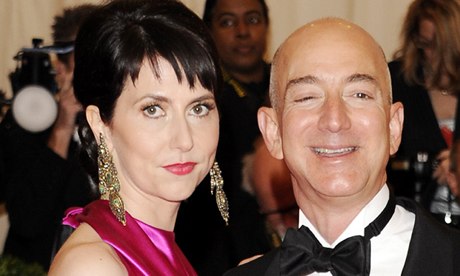
MacKenzie Bezos's scathing one-star Amazon review of a book about her husband, the site's billionaire boss Jeff Bezos, suggests that online spousal supportiveness may soon become a loving duty, not just the crazy spasm of rage or embarrassing outpouring of affection that – as reactions on social media testify – it's currently seen as. Mrs Bezos, who as a novelist has won an American Book Award (in 2006, for The Testing of Luther Albright), took Brad Stone's The Everything Store: Jeff Bezos and the Age of Amazon to task for, in effect, trespassing on her territory, using techniques that "stretch the boundaries of non-fiction" and result in "way too many inaccuracies" – as in its claim that her husband's reading of Kazuo Ishiguro's The Remains of the Day played a role in his setting up Amazon (he only read it afterwards, she wrote).
MacKenzie Bezos's intervention, however, was scholarly and measured (key sign: no swear words) by the usual standards of pro-spouse commentary, as recently exemplified by the rock star Amanda Palmer's "review" on her blog of her husband Neil Gaiman's latest novel, The Ocean at the End of the Lane. She began by hailing it as "absolutely fucking amazing", advanced a theory that both of them throw personal ingredients into the "art blender" but with different dial settings (helpfully illustrated), and chattily detailed aspects of their marriage ("it's impossible to write a blog about his new book without talking about us").
Similarly candid, though in Bezos-style attack mode rather than adoration mode, was the defence of Michael Chabon by his wife Ayelet Waldman, a fellow novelist but also known for confessional writing and outspoken views on motherhood. Amazon reviews in 2011 of Chabon's first children's book, The Astonishing Secret of Awesome Man (including one asking if it was the best a Pulitzer winner could do), led to tweets from Waldman denouncing "jackasses" and "fucking Amazon reviewers giving Awesome Man 1 star... IT WAS WRITTEN FOR LITTLE KIDS". Twitter was also her chosen vehicle when she slated Katie Roiphe for criticism of her husband's style.
Chabon, for his part, had earlier taken up the cudgels on her behalf in an interview during the controversy about her essay Motherlove, but, instead of assailing individuals, portrayed her as a victim of the culture of the "slagosphere", where anyone with their head above the parapet is seen as fair game.
Spousal solidarity has yet to become as overt in the UK as it is for some US power couples, with George Osborne discreetly puffing a book by his wife, Frances, in a Spectator Books of the Year round-up the closest equivalent to Palmer's effusions. As far as we know, scandalous online behaviour here is limited to writers – the historian Orlando Figes, at least two crime novelists – praising themselves and/or attacking rivals using sock-puppet pseudonyms, not wives or partners.
The most obvious exception came when the novelist Julie Myerson wrote about her son's drug addiction in her 2009 non-fiction book The Lost Child, and was attacked for betraying family secrets. With "most of the British press queuing up to criticise Julie for writing about the devastation that skunk has worked on our family", her husband Jonathan, also a writer, defended her in the Guardian. But although he complained the attacks were either "ill-informed or plain vitriolic", the piece was very British in its sorrowful tone and the absence of ad hominem retaliation. References to jackasses were entirely absent.
• This story has been corrected to show that MacKenzie Bezos won an American Book Award.

